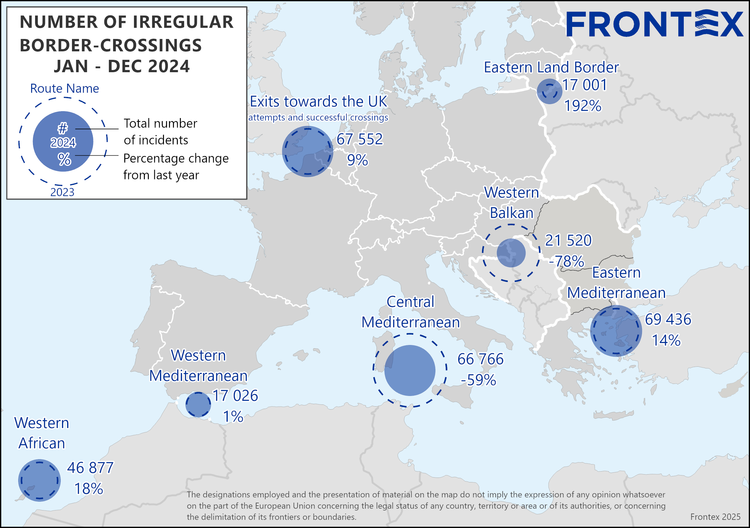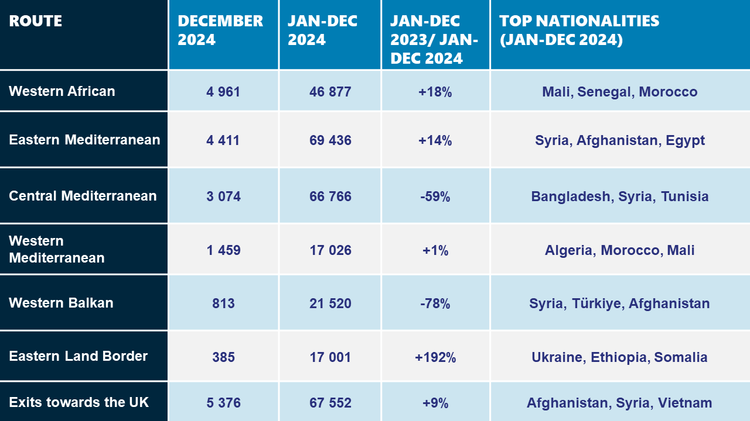New preliminary data from Frontex reveal a significant 38% drop in irregular border crossings into the EU in 2024, reaching the lowest level since 2021, when migration was still affected by the COVID-19 pandemic. Despite persistent migration pressure, intensified EU and partner cooperation against smuggling networks has significantly reduced crossings at Europe’s external borders, with just over 239,000 detections recorded last year, Frontex reports.
The decrease in the total number was mainly driven by a 59% plunge in arrivals via the Central Mediterranean route and a 78% fall in detections on the Western Balkan route.
Not all routes saw the same trends, as patterns shifted across the continent. Key developments include:
- Central Mediterranean route: Crossings dropped by 59% due to fewer departures from Tunisia and Libya. Despite the significant decrease, this route still accounted for about 67,000 crossings, the second highest among all routes.
- Western Balkan route: A sharp 78% fall followed strong efforts by regional countries to stem the flow.
- Eastern Mediterranean route: Detections rose by 14% to 69 400, driven by new corridors from eastern Libya, with migrants predominantly from Syria, Afghanistan, and Egypt.
- Western African route: The Canary Islands saw an 18% increase in arrivals to almost 47 000, the highest figure since Frontex began collecting data in 2009. This was fuelled by departures from Mauritania, even as flows from other departure points declined.
- Eastern Borders route: A threefold increase in crossings was reported, mostly along the borders with Ukraine and Belarus.
- English Channel: Detections of attempted crossings to the UK rose slightly, up 9% compared to 2023.

A closer look at demographics shows that the share of women among detected migrants held steady at just over 10%. Markedly, 62% of all women arriving at EU borders entered through the Eastern Mediterranean route, reflecting the dangers and changing dynamics on other paths. Afghan and Syrian women made up the majority of this group.
The share of minors among the irregular migrants increased last year to 16% from 13% in 2023.
Commenting on the preliminary figures, Frontex Executive Director Hans Leijtens said:
Every year, we face unique challenges at our borders that require constant vigilance and adaptability. While 2024 saw a significant reduction in irregular border crossings, it also highlighted emerging risks and shifting dynamics. Frontex and the border authorities across Europe must remain ready and flexible to address these evolving challenges effectively. Our commitment is to protect Europe’s borders while upholding the highest standards of humanity and cooperation.
While the 2024 irregular migration figures reflect progress, challenges remain. Smuggling networks adapt to new circumstances, and migration flows can shift quickly. Authorities reported increasing violence by smugglers along the Western Balkan route, and growing instability in regions like the Sahel continues to drive migration towards Europe.
The sea crossings, usually orchestrated by organised criminal networks, continue to pose an extreme danger to migrants. The International Organization for Migration (IOM) estimates that 2 300 people lost their lives at sea in 2024 alone, underscoring the tragic human cost of these hazardous routes.

Frontex, the European Border and Coast Guard Agency, supports EU Member States and Schengen-associated countries in the management of the EU’s external borders and the fight against cross-border crime.
TunisianMonitorOnline (NejiMed –frontex)




